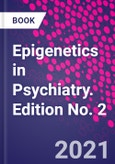Epigenetics in Psychiatry, Second Edition covers all major areas of psychiatry in which extensive epigenetic research has been performed, fully encompassing a diverse and maturing field, including drug addiction, bipolar disorder, epidemiology, cognitive disorders, and the uses of putative epigenetic-based psychotropic drugs. Uniquely, each chapter correlates epigenetics with relevant advances across genomics, transcriptomics, and proteomics. The book acts as a catalyst for further research in this growing area of psychiatry.
This new edition has been fully revised to address recent advances in epigenetic understanding of psychiatric disorders, evoking data consortia (e.g., CommonMind, ATAC-seq), single cell analysis, and epigenome-wide association studies to empower new research. The book also examines epigenetic effects of the microbiome on psychiatric disorders, and the use of neuroimaging in studying the role of epigenetic mechanisms of gene expression. Ongoing advances in epigenetic therapy are explored in-depth.
Please Note: This is an On Demand product, delivery may take up to 11 working days after payment has been received.
Table of Contents
Part 1: General Aspects of Epigenetics in Psychiatry1. Introduction to Epigenetics in Psychiatry
2. Outline of Epigenetics
3. A Brief History of Epigenetics in Psychiatry
4. Roles of Epigenetics in the Neural Stem Cell and Neuron
5. Role of Epigenetics in the Brain
6. Epigenetic Epidemiology of Psychiatric Disorders
7. ATAC-seq and Psychiatric Disorders
8. Single Cell RNA Sequencing and Psychiatric Disorders
9. Single Cell Analysis and Psychiatric Disorders
10. Laboratory Techniques in Psychiatric Epigenetics
11. Laboratory Epigenetic Models of Schizophrenia
12. Animal Models of Environmental Manipulations Resulting in Epigenetic Modifications That Increase Risk for Affective Disorders
Part 2: Epigenetics of Psychiatric Disorders
13. 5-Methycytosine and 5-Hydroxymethylcytosine in Schizophrenia
14. Pathogenic Histone Modifications in Schizophrenia are Targets for Therapy
15. Non-Coding RNAs and Psychiatric Disorders
16. Epigenetics of Bipolar Disorder
17. Epigenetics in Major Depressive Disorder
18. The Epigenetics of Suicide: The Critical Impact of Environment on Epigenetic Regulation in Suicide
19. Epigenetics in Posttraumatic Stress Disorder
20. Epigenetics and Cognitive Disorders
21. Epigenetics in Intellectual Disability
22. Epigenetics and Pervasive Developmental Disorders
23. Epigenetics in Child Psychiatry
24. Epigenetic Mechanisms of Drug Addiction Vulnerability
25. Epigenetics and Addiction to Alcohol
Part 3: Epigenetics in the Therapy of Psychiatric Disorders
26. Epigenetic Effects of Currently Used Psychotropic Drugs
27. DNA Methyltransferase Inhibitors and Psychiatric Disorders
28. Histone Deacetylase Inhibitors and Psychiatric Disorders
29. Psychotherapy and Epigenetics in Psychiatry
30. Gene-Specific Editing for Manipulating Specific Psychiatric Disorders
Part 4: Other Topics in Epigenetics in Psychiatry
31. Nutritional Effects on Epigenetics in Psychiatry
32. Systems Biology and the Epigenetics of Psychiatric disorders
33. Transgenerational (Heritable) Epigenetics and Psychiatric Disorders
34. Epigenetic Aspects of the Microbiome and Psychiatric Disorders
Authors
Jacob Peedicayil Professor, Department of Pharmacology and Clinical Pharmacology, Christian Medical College, Vellore, India. Dr Jacob Peedicayil completed MBBS in 1984 and MD in pharmacology in 1991, both at the Christian Medical College, Vellore, India. From 1993 to 1995 he did a Post-Doctoral Fellowship at the Centre for Cellular and Molecular Biology, Hyderabad, India. From 1995 to 1998 he worked as a Research Fellow in the Department of Neurological Sciences, Christian Medical College, Vellore. Since 1998 he has been on the faculty of the Department of Pharmacology and Clinical Pharmacology, Christian Medical College, Vellore, becoming a professor in 2007. He does theoretical research on epigenetics, focusing on epigenetics in psychiatry. In addition, he is involved in experimental research in smooth muscle pharmacology. Dennis R. Grayson Professor of Molecular Neuroscience, University of Illinois at Chicago, IL, USA. Dr Dennis R. Grayson received his PhD from the Department of Biochemistry at Wayne State University School of Medicine in 1984. He has been interested in mechanisms associated with gene expression for over 35 years. He joined the laboratory of Dr James E. Darnell at the Rockefeller University as a Post-Doctoral Fellow in 1984 to study cell-type specific transcription factors and their interaction with promoters and enhancers. In 1988, Dr Grayson joined the Fidia-Georgetown Institute for the Neurosciences at Georgetown University to study gene expression programs in neurons and continued this research program at Allegheny Singer Research Institutein Pittsburgh from 1995 to 1998. He continued his interests in psychiatry and joined the Psychiatric Institute at the University of Illinois in 1998. This represented a unique opportunity to pursue the molecular underpinnings of schizophrenia. Dr Grayson has received NRSA post-doctoral support, and R01 and K04 funding from the National Institutes of Health to support his work. He has published over 140 papers in peer-reviewed journals and is regularly invited to speak at numerous national and international meetings. He is currently Director of the Epigenetic Core of the Center for Alcohol Research in Epigenetics. Dimitri Avramopoulos Associate Professor of Genetic Medicine, Johns Hopkins, Medicine, Baltimore, MD, USA. Dr. Dimitrios Avramopoulos received his MD from the University of Athens, Greece in 1990 and his PhD from the University of Crete in 1995 for his work on mapping human genes on chromosome 21 and deciphering the origin of chromosomal non-disjunction in trisomy 21, mentored by Dr Stylianos Antonarakis. He undertook his post-doctoral work at Johns Hopkins University where he became a faculty member in the Department of Psychiatry in 2002. He is currently on the faculty of the Department of Genetic Medicine and the Department of Psychiatry at Johns Hopkins University where he works on the genetics of psychiatric disorders. He is interested in the identification and functional follow up of disease-causing variants in the genome. He uses cellular models and genome editing to decipher the mechanisms through which disease - associated variants affect the brain, individually or in combinations, through the disruption of functional networks and the regulation of the corresponding genes.








